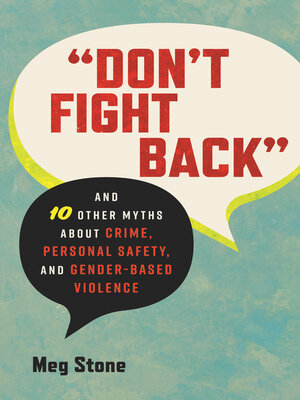"Don't Fight Back"
ebook ∣ And 10 Other Myths About Crime, Personal Safety, and Gender-Based Violence · Myths Made in America
By Meg Stone

Sign up to save your library
With an OverDrive account, you can save your favorite libraries for at-a-glance information about availability. Find out more about OverDrive accounts.
Find this title in Libby, the library reading app by OverDrive.



Search for a digital library with this title
Title found at these libraries:
| Library Name | Distance |
|---|---|
| Loading... |
From a nationally recognized abuse-prevention expert, an accessible guide that debunks the most pervasive myths about personal safety and offers evidence-based advice that actually improves safety
We receive a lot of advice about how to stay safe in society. Sometimes the advice is about the nature of violence or crime and other times it is a common directive about what people should do to keep us away from potential danger.
Meg Stone, an expert in personal safety and empowerment self-defense, traces the origins of these dangerous myths, and explains why safety isn't defined by men in power telling us what they think makes us safe.
Stone breaks down these myths into 4 parts:
how attackers behave (“Don’t Fight Back. It Will Make the Attacker Angry and You’ll Get Hurt Worse."), what (or who) to fear ("Crime Is at an All-Time High and Going Up"), what you should never do ("Don’t Wear a Ponytail. An Attacker Could Grab It."); and what you should always do ("Always Trust Your Intuition") She addresses how many of the myths are completely wrong and not based on any real evidence. Stone also spends time unpacking the kinds of myths that can't be disproven or are more nuanced than just "helpful" or "not helpful."
Each chapter also offers advice for individuals to keep themselves safer and also how to contribute to social change when these myths are perpetuated.
She concludes with a powerful treatise about how to be truly safe—or at least safer—in a world that lacks evidence, using lessons she has learned from her 20+ years teaching self-defense.
We receive a lot of advice about how to stay safe in society. Sometimes the advice is about the nature of violence or crime and other times it is a common directive about what people should do to keep us away from potential danger.
Meg Stone, an expert in personal safety and empowerment self-defense, traces the origins of these dangerous myths, and explains why safety isn't defined by men in power telling us what they think makes us safe.
Stone breaks down these myths into 4 parts:
Each chapter also offers advice for individuals to keep themselves safer and also how to contribute to social change when these myths are perpetuated.
She concludes with a powerful treatise about how to be truly safe—or at least safer—in a world that lacks evidence, using lessons she has learned from her 20+ years teaching self-defense.







